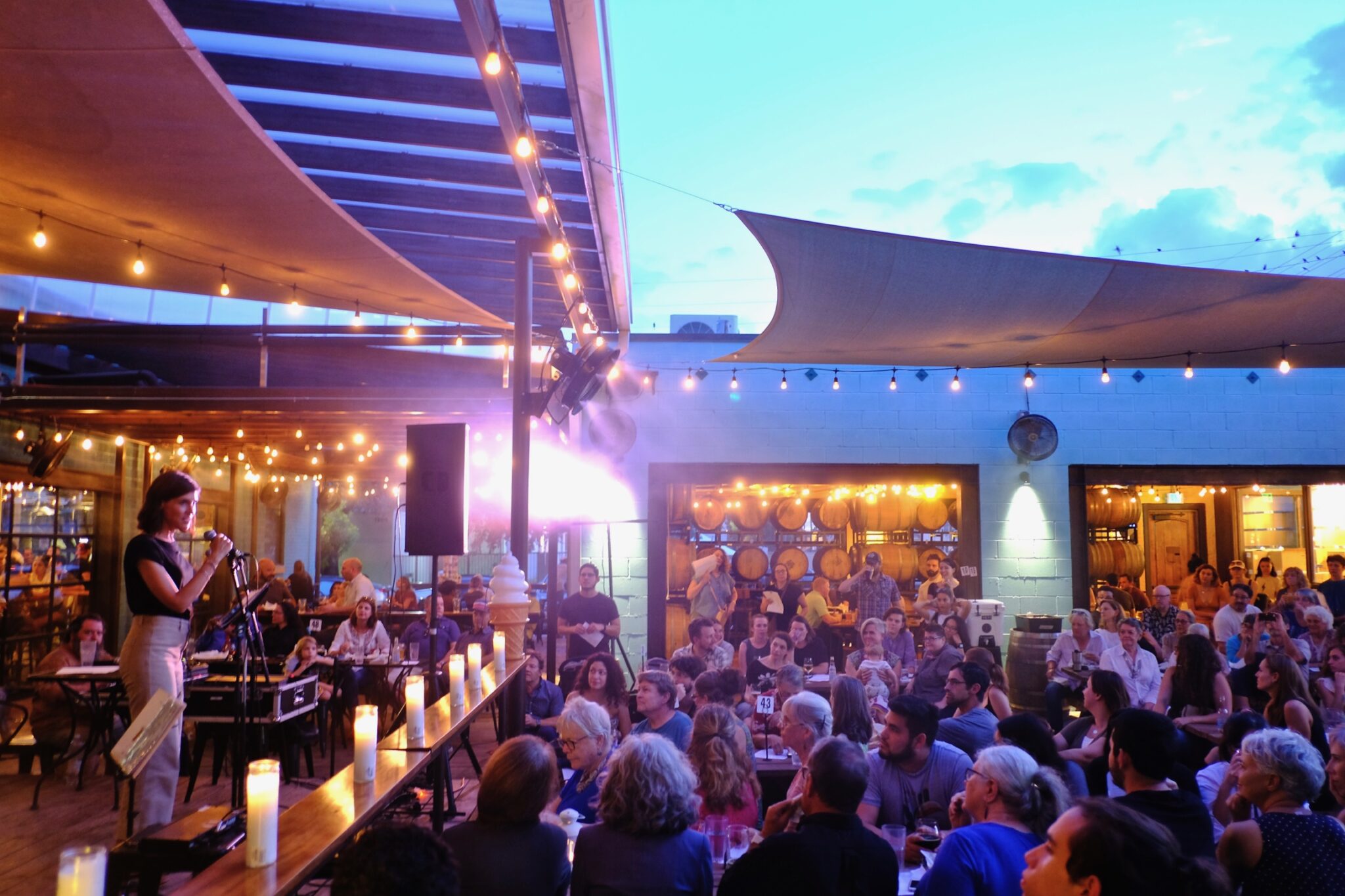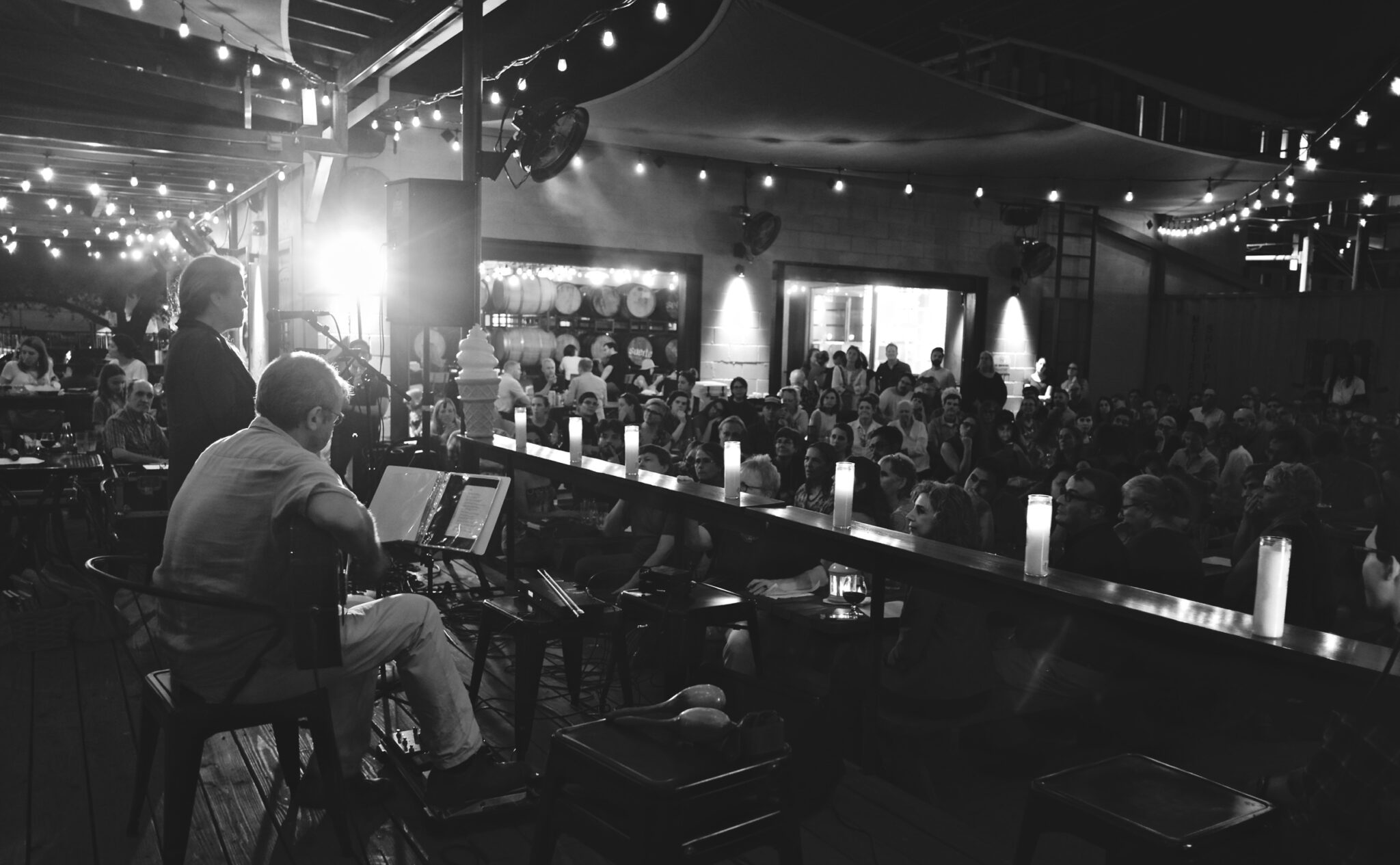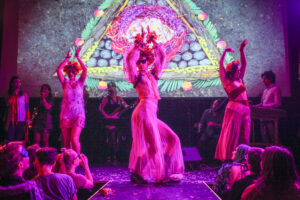IT STARTED WITH A CONVERSATION: a priest and poet walk into a coffee shop in late 2017 and begin discussing how transactional poetry readings can sometimes seem. I am a recently ordained Episcopal priest completing a PhD in theology and poetry. Grace has an MFA in poetry and tends to approach questions of meaning from a Buddhist framework. We talk about how at readings it can often feel as if you are either passively absorbing poetry from the audience or discharging it at people from the podium. We begin wondering what it might look like to incorporate aspects of sacred ritual into the structure of a reading, about how to cultivate a space that would feel participatory and dynamic.
Four months later, the Cool Store—an iconic east-Austin gas station converted into a tasting room and event space—is beginning to fill. I am sweating in the late-June heat. All afternoon I’ve been driving around town to pick up the PA system and speakers, running mic cords, setting up spot-bulbs. Bistro lights are slung casually from floor-to-ceiling tequila casks in which craft beer is aging. Lazarus Brewing was started by a Presbyterian pastor, and all its beers have Calvinistic names: Walks on Water Pale Ale, Double Predestination IPA. Rays of evening sun cascade through the stained glass on the bar’s patio, reminding me of T.E. Hulme’s definition of Romanticism as “spilt religion.”
The sweat is not just from the heat. The house is filling, and this is my first time emceeing a reading. The poets we are featuring are friends: one a recent UT graduate, the other my psychotherapist, a fellow poet-priest. On the polished wooden picnic tables sit the “orders of service” we have printed, as well as glasses of beer and wine and abundant baskets of chips with guac and queso. I approach the mic, blow into it once, and say for the first time: “Beloved, welcome to LOGOS.”
Logos means “word,” but for the Greeks it also encompassed ideas of reason, thought, and discourse. Ancient philosophers used it to denote a rational, ordering, unifying principle that inhered in the more-than-human world. Early Christian theologians came to identify the logos with Christ: the Word within the words. LOGOS Collective had its genesis in the effort to tap into and channel the “immortal longings” (as Shakespeare’s Cleopatra puts it) coursing through each of us. We strive to cultivate meaningful connection and catalyze conversation by exploring and “exegeting” spiritual and theological resonances of texts. Our aim is expressed in our tagline: “Evoking transcendence through poetry, ritual, and conversation.”

Poet Carrie Fountain reads at a LOGOS gathering in Austin, Texas, in 2019. Photo: Zac Koons.
What arose from that first conversation between Grace and me was a vision for a liturgically inflected reading series. By artfully, lovingly, non-dogmatically mapping aspects of church ritual onto the format of a reading, we strive to cultivate conditions for transcendence: an experience of meaning and connection that lifts you up off of the world awhile in order to more deeply ground you afterward in the earth.
Our gatherings follow a pattern: After a word of welcome, we take a few moments of silence, tolled in by a meditation bell. Then the emcee leads the “congregation” in an antiphonal reading of a poem—a line-by-line communal recitation—as opening invocation. The congregants have the opening text printed in front of them, a favorite poem chosen by one of the featured poets. Certain lines are bolded for all to read together, to create a call-and-response in which each voice takes part (the way you’d read a psalm in church). The first poet is introduced and delivers a set, the final poem of which is printed in the order of service. We then invite everyone to take a few minutes discussing that poem, or whatever the reading summoned up for them, at their tables. After the second poet reads and is discussed, a brief homiletic moment follows, in which the emcee synthesizes themes that have emerged. To close, we read a benediction poem responsively, and there is an invitation to linger over a celebratory “communion” of conversation, tacos, and libations. The hope is that by having attended to poets’ work wholeheartedly, we will come to see the world and those who move within it a little more clearly, so that we may love it, and one another, a little better and put that love into action.
As an organization, LOGOS is at its essence doing what theologians describe as theopoiesis—literally “making God (present).” Whether you call it God, Love, Mystery, Wonder, or Quantum Weirdness—what we want to make present is whatever reality is woven into this one and transcends that which we can sense or explain away through empirical analysis. What we are really after is connection, communion through imagination. The imagination is not just a means of creativity, but also our faculty for hope and empathy. Through imagination (which I believe is grounded in what the creation poem of Genesis calls the imago Dei—our being made in the image of the divine), we can divest ourselves of the presumption that any one of us possesses a single, definitive lens on experience, and can more truly attend to another’s way of seeing.
There is risk in this (see Camille Rankine’s elucidating essay “The Known Unknown: Persona, Empathy, and the Limits of Imagination,” published on the Poetry Foundation blog). We cannot co-opt another’s subjectivity or colonize another’s mind; but we can learn to see one another more clearly, perhaps even baptize our eyes so that we can see each other in our mutual divinity. Curating these gatherings as a white, hetero, cisgender man, I hope only to amplify the voices of the poets we are celebrating. To convene a large-hearted community requires humility—in the root sense of humus, “soil,” groundedness: having neither a higher nor lower view of ourselves than an objective, loving other (deity or human) might.
LOGOS has evolved since that first reading in June 2019. In the beginning, we collaborated exclusively with Austin-based poets; but when Covid-19 suspended in-person gatherings, we began translating our format from analog to digital, gathering monthly on Zoom, which allowed us to connect with poets and communities further afield. In early 2021, LOGOS merged with a like-souled project, EcoTheo Review, an online and quarterly print journal edited by Episcopal priest and poet Jason Myers committed to “enlivening conversations and commitments around ecology, spirituality, and art.” Together we’ve merged into a new canopy organization, EcoTheo Collective, with a mission to “celebrate wonder.” In collaboration with Cave Canem, EcoTheo established the Starshine and Clay Fellowship to center and amplify the work of emerging Black poets; and in 2022 EcoTheo takes on sponsorship of the Lorca Prize for Latinx Poets. We are always learning, always growing.
I became a priest because of a deep, keen yearning to traffic in transcendence. In celebrating (a word that means both “giving thanks” and “praising”) communion, we are able to make the ineffable tangible. Take, eat: this is God’s body, made real, made actual for you. Take, receive: here, God that you can touch, hold, and taste; a body you can take into your body; God that becomes a part of you.
Poets also make transcendence tangible, using the materiality of language—its written shapes, its sonic texture—to give form to the invisible and abstract. Through the artful employment of sound and sense, poetry communicates intellectually as well as emotionally—with the head as well as the heart. It can give us an experience of the divine, of the beyond, in ways that academic theology cannot. Academic theology is like writing down a recipe; poetry (like mysticism and meditation) is serving up a feast. Poems perform spiritual truth by following the logic of the lyric rather than the slipstream machinations of the egoic mind. Poems give flesh to our hopes and fears and cell-deep longings, manifesting what groans most deeply in the bone and loam of things.

Poet Naomi Shihab Nye and guitarist Darrel Mayers at a LOGOS gathering in Austin, Texas, in 2019. Photo: Zac Koons.
Such experience is what we strive to offer up at LOGOS. Gathering on those sweltering evenings, hugging and high-fiving around those tables once the house music is back on, lifting glasses in celebration: it makes me want to take my shoes off, as if we’ve trod on hallowed ground.
The institutional church has caused so much harm and violence over the centuries. It has perpetuated and benefited from systems of immense privilege and damnable oppression, inflicting unaccountable damage upon far too many people and communities. I hope that repentance—turning from an old reality to a new way of seeing—is a part of the story we are coauthoring at EcoTheo Collective. Poetry has authority, in the true, etymological sense of that word: attending to one another’s witness through poems can help us ultimately author a better story. I believe that poems and the insights they incarnate, the truths they embody, can be a small yet crucial part of a collective journey of exorcising toxic ways of thinking and theologizing—that ultimately, poetry may offer some manner of salvation, in the deep sense of that word (from the Latin salvus, “health” or “wholeness”): a salving for our souls.
LOGOS Collective would love to have you join them. Visit www.ecotheo.org/logos for information about upcoming events, as well as archived recordings of events with poets including Jericho Brown, Rita Dove, Camille Dungy, Jane Hirshfield, Marie Howe, Nate Klug, Marilyn Nelson, Aimee Nezhukumatathil, Pádraig Ó Tuama, and many others.
Travis Helms is an Episcopal priest serving the University of Texas campus. He codirects EcoTheo Collective and is the author of Blowing Clover, Falling Rain: A Theological Commentary on the Poetic Canon of the American Religion (Wipf & Stock).





